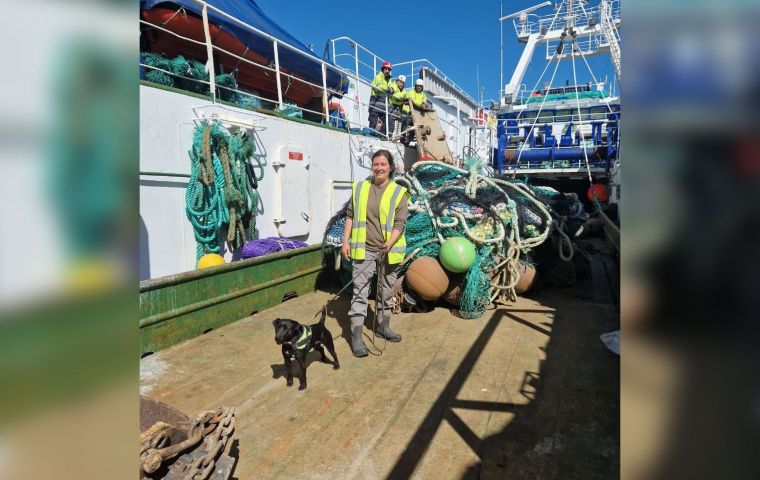MercoPress. South Atlantic News Agency
South Georgia launching the Biosecurity Dog Program to check on rodents
 Dogs sniffing cargoes on vessels in the Falklands
Dogs sniffing cargoes on vessels in the Falklands Some seven years ago this month, the island of South Georgia was declared free or rodents, rats and mice, becoming the world’s biggest and successful project to eradicate the dangerous, destructive invasive species. For nearly 250 years rodents had devastated the island’s wildlife.
Thus the Government of South Georgia and the South Sandwich Islands, is launching its biosecurity dog program seeking a contractor to provide continuity to the biosecurity program services, which will be based in Stanley, Falkland Islands.
Tender conditions according to the publication include,
• Provision of handlers and dogs for the detection of rodents aboard vessels and cargo bound for South Georgia and the South Sandwich Islands.
• Able to deploy anywhere in the Falkland Islands, including Mare Harbor, and be able to deploy to South Georgia in case of an incursion.
• Accurate record keeping for searches.
• Ongoing training of dogs and handlers to a recognized professional standard
The expected start date of the contract is from 1 of October 2025 for three years firm and a two-year option to extend on mutual agreement, total five years.
Closing date for submissions: 23 June 2025
For further information or to arrange an informal discussion, please contact denise.blake@gov.gs or call +500 28200.
A brief history indicates that rats and mice were inadvertently introduced to South Georgia by ships that stopped there, usually on whaling expeditions. The effect on native bird populations was dramatic. Unused to predators, they laid their eggs on the ground or in burrows, easily accessible to the rodents.
Two species of birds unique to the island, the South Georgia pipit and pintail, were largely confined to a few tiny islands off the coast, which the rodents could not reach, and penguins and other seabird populations were also threatened.
A decade long project costing some £10m and using poisoned baits did the job. However scientists have spent the intervening period monitoring the Island for rodents. Originally two experienced dog handlers from New Zealand walked three dogs – named Will, Ahu and Wai – across nearly 1,550 miles (2,500km) in often extreme weather, beset by heavy rain and often fierce storms, seeking out signs of rats and mice.




Top Comments
Disclaimer & comment rulesCommenting for this story is now closed.
If you have a Facebook account, become a fan and comment on our Facebook Page!